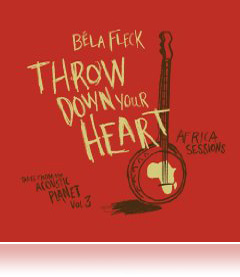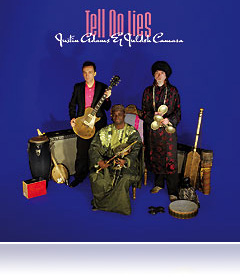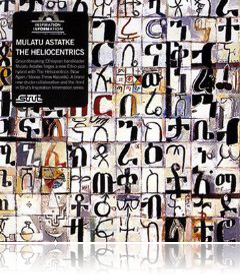June 1, 2009Shannon's Select Sounds: The
African Connection
 Out of Africa comes this
month’s "Select Sounds" picks, and all three of these new releases are
absolutely incredible. Each disc showcases styles inherently different from the others,
but the unifying theme is of African musicians collaborating with UK and US players to
produce profound results. Out of Africa comes this
month’s "Select Sounds" picks, and all three of these new releases are
absolutely incredible. Each disc showcases styles inherently different from the others,
but the unifying theme is of African musicians collaborating with UK and US players to
produce profound results.
The most traditional is banjo-player Béla Fleck’s Throw
Down Your Heart: Africa Sessions -- Tales from the Acoustic Planet Vol.3 (CD, Rounder
11661-0634-2). Vol.1 of Fleck’s Acoustic Planet series, a collection of
great jazz and bluegrass musicians backed by Fleck’s band, the Flecktones, was
released in 1995. The second volume, The Bluegrass Sessions (1999), carried on in
similar fashion. But for Vol.3 Fleck has taken quite literally his "Acoustic
Planet" concept, which here has carried him back to mankind’s motherland.
In 2005, Fleck, who has won ten Grammys, made a three-month
journey to Africa to explore the origins of his instrument, and found a wellspring of
inspiration along the way. Traveling through Uganda, Tanzania, Mali, and The Gambia, Fleck
sat down with renowned musicians, indigenous virtuosos, and village women and children,
and recorded their music. Playing the role of student rather than teacher, Fleck
encouraged the African musicians to take the reins; while his banjo picking enhances each
song, it never demands center stage.
These field recordings authentically capture the current
state of traditional African music, and Fleck’s pilgrimage to search out some of the
greatest living African musicians succeeds in tracks by Malian songbird Oumou Sangare;
Basselou Kouyate, master of the n’goni (the Malian banjo); and Toumani
Diabate, living legend of the kora. Other traditional African instruments are
featured, including the original ancestor of the banjo, the akonting, as well as a
12’-long giant marimba, thumb pianos, and lyre. "Matitu," by the Tanzanian
marimbist Khalifan Matitu, offers a beautiful melody over an elaborately complicated
rhythm whose time signature, Fleck admits in the liner notes, still confounds him.
This trek was no small undertaking: Joining Fleck were a
film crew headed by his younger brother, Sascha Paladino, who documented the entire trip;
and the sound engineers, who worked to achieve optimal quality on every take. Considering
that most of these recordings were made outdoors, sometimes in remote locales, the sound
is impressively good. The resulting film, Throw Down Your Heart, which will go into
general release later this year, has already won several awards at various film festivals.
For more information about album and film, visit www.throwdownyourheart.com.
 Béla Fleck isn’t the
only one looking to Africa for inspiration. British guitarist Justin Adams, best known for
his work touring with Robert Plant, forged a musical relationship with Gambian griot
Juldeh Camara after a phone call during which the two played for one another and
determined that they should meet to make some real music together. Their 2008 release, Soul
Science, is still in heavy rotation on my stereo, so I’m happy to see, just a
year later, a second album, the equally exciting Tell No Lies (CD, Real World
USCDRW 170; to be released June 19). The exchange of musical cultures between these two is
practically kinetic. Initially, one might question the compatibility of blues guitar with
the African griot tradition of storytelling and the ritti, a single-string West
African spike fiddle -- but Adams’s guitar licks talk back in time with the
storytelling in ways similar to the traditional call and response of the blues, and
Camara’s fiddling is spirited in African tradition, but rooted in rock and delivered
with a sick attack. Béla Fleck isn’t the
only one looking to Africa for inspiration. British guitarist Justin Adams, best known for
his work touring with Robert Plant, forged a musical relationship with Gambian griot
Juldeh Camara after a phone call during which the two played for one another and
determined that they should meet to make some real music together. Their 2008 release, Soul
Science, is still in heavy rotation on my stereo, so I’m happy to see, just a
year later, a second album, the equally exciting Tell No Lies (CD, Real World
USCDRW 170; to be released June 19). The exchange of musical cultures between these two is
practically kinetic. Initially, one might question the compatibility of blues guitar with
the African griot tradition of storytelling and the ritti, a single-string West
African spike fiddle -- but Adams’s guitar licks talk back in time with the
storytelling in ways similar to the traditional call and response of the blues, and
Camara’s fiddling is spirited in African tradition, but rooted in rock and delivered
with a sick attack.
"Fulani Coochie Man" borrows the melody of Muddy
Waters’ "Hoochie Coochie Man," but Camara’s lyrics plead for help for
the poor and a more even distribution of wealth and resources. This is the role of the
griot in African culture: born into a long line of traditional storytellers, a griot is
expected to speak the truth and spread honest, positive messages through song. Other songs
on Tell No Lies remind youth to know their roots, and encourage young women to
pursue an education, study their history, and be examples to others. The fusion of the
griot tradition, African rhythms, and Adams’s contributions results in a spirited and
uplifting album.
 I found this month’s
third pick, Mulatu Astatke and the Heliocentrics’ Inspiration Information, Vol.3 (CD,
Strut 040CD), while thumbing through new releases in a record store. In a sea of other
discs vying for my attention, this one stood out. Legendary Ethiopian bandleader Astatke
founded what became known as Ethio-jazz in New York City in the 1960s; the Heliocentrics
are a nine-piece British collective who meld the hip-hop, jazz, funk, electronic, and
psychedelic genres in fluid fusion, and have backed such artists as DJ Shadow and MadLib.
Strut Records has united the two for this third release in the label’s Inspiration
Information series, an ongoing project that aims to pair "modern artists and
producers with their musical heroes." The result is fresh, fresh, fresh -- funky but
very jazzy, and reminiscent of Miles Davis’ work in Dark Magus, but richer in
soul. If you ever wondered what happened to acid jazz, you’ll find elements of it
here a decade later. I found this month’s
third pick, Mulatu Astatke and the Heliocentrics’ Inspiration Information, Vol.3 (CD,
Strut 040CD), while thumbing through new releases in a record store. In a sea of other
discs vying for my attention, this one stood out. Legendary Ethiopian bandleader Astatke
founded what became known as Ethio-jazz in New York City in the 1960s; the Heliocentrics
are a nine-piece British collective who meld the hip-hop, jazz, funk, electronic, and
psychedelic genres in fluid fusion, and have backed such artists as DJ Shadow and MadLib.
Strut Records has united the two for this third release in the label’s Inspiration
Information series, an ongoing project that aims to pair "modern artists and
producers with their musical heroes." The result is fresh, fresh, fresh -- funky but
very jazzy, and reminiscent of Miles Davis’ work in Dark Magus, but richer in
soul. If you ever wondered what happened to acid jazz, you’ll find elements of it
here a decade later.
Astatke fills his role of mentor well: on piano,
vibraphone, and Wurlitzer, his offerings are always tasteful and impressive without being
flashy. The Heliocentrics breathe new life into some of his older compositions, such as
"Cha Cha" and "Mulatu," and Astatke gladly returns the favor on
compositions by Heliocentrics drummer/pianist Malcolm Catto ("Addis Black
Widow," "Fire in the Zoo"). The guitars and sparse vocals take a back seat
with hollowed-out sound, while the bass, drums, and percussion are out front on every
track. Flute, piano, horns, and theremin bleed through precisely, and the whole is a
simmering pot -- a thick, rich stew of grooves. Oh, delish!
These three albums are enough to inspire my own musical
pilgrimage to Africa . . . what a thought! Perhaps my true calling is calling. Listen
closely, and maybe you’ll hear it too. Don’t ask me to pick a favorite --
it’s just not possible. Buy all three and thank me later. I can’t stop listening
to these albums.
. . . Shannon Holliday
|















